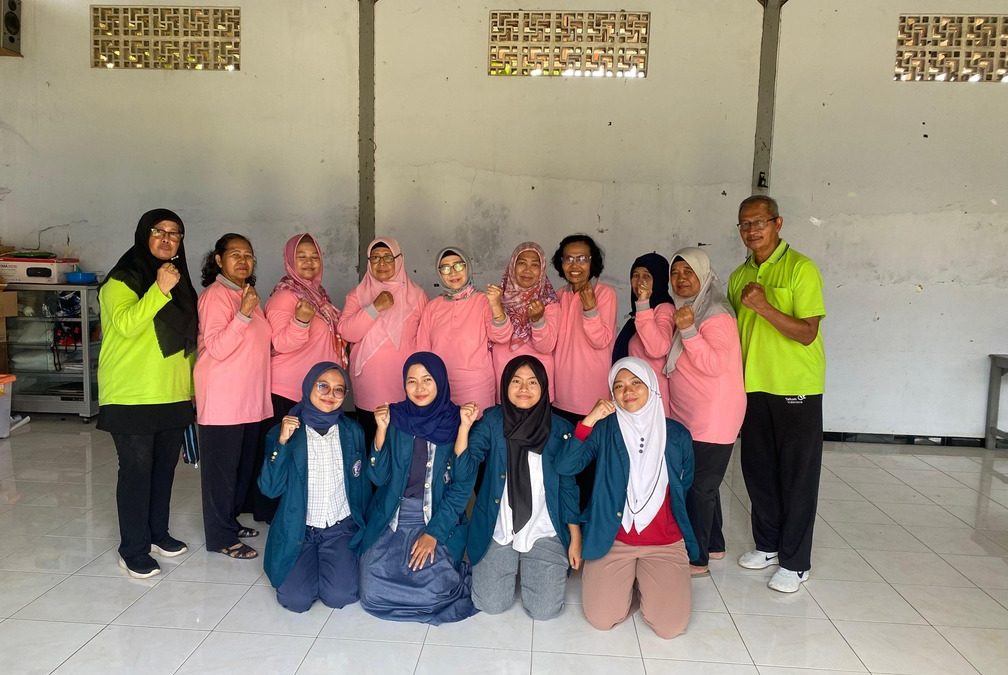Kemambang Village, Banyubiru District, Semarang Regency, Central Java, is now witnessing an epic transformation spearheaded by Diponegoro University’s KKNT Team 167. This is no ordinary work program; it’s a noble mission with an ambitious vision: “Net Zero Emission Sitaring Tourism Village.” More than just physical installations, it’s a massive empowerment movement integrating Solar Photovoltaic (PV) Systems and holistic waste management. The goal is to revitalize homestays and camping grounds, awaken a collective awareness of renewable energy, and establish Sitaring Tourism Village as a beacon of sustainable ecotourism in Indonesia.
The primary pillar at the heart of this program is the implementation of Solar PV systems. SAINTEK 4 Team, an integral part of KKNT Team 167, is strengthened by the intelligence of Febryana Mega Susanti and Rahmalia Izza Fathnia. Febryana carries the monumental responsibility of designing and assembling the complex wiring for the PV system’s load. From the serene musholla, the warm glow of gazebo lights, to the dazzling illumination of the garden area, everything is connected to the solar energy network. Febryana even ensured that all wiring for the captivating camping ground and the iconic Sitaring café was perfectly connected. This concrete step not only provides lighting solutions but also revolutionarily raises awareness among residents, especially Bapak Kepala Dusun Puwono, about the importance of transitioning to environmentally friendly electricity.

Equally vital, Rahmalia Izza Fathnia acts as a nimble right hand in the PV system installation process. She not only assists with the installation but also actively participates in the removal of previous load cables, precise measurement and cutting of cables according to installation needs, intricate battery cable crimping, and actively assists in the installation of batteries and balancers for the Sitaring PV system. The excellent collaboration between Febryana and Rahmalia ensures that the output, in the form of the PV system installation in Sitaring Tourism Village, not only functions optimally but operates with peak performance, offering unprecedented energy independence and reducing reliance on damaging conventional energy sources.
This KKNT program also delves into waste management with unexpected innovations, transforming waste into valuable assets. SAINTEK 1 Team from KKNT Team 167 makes a breakthrough with the Partner Waste Bank empowerment program, focusing on recycling household waste into environmentally friendly and economically valuable products. Malika Pintanada Kaladinanty, with her expertise, demonstrates the saponification process of used cooking oil into quality solid and liquid soaps, guiding residents from collection to soap molding. Deas Oky Pratama introduces a revolutionary solution for organic waste management: maggot (BSF larvae) cultivation, serving as an organic waste decomposer and animal feed source. Sheva Risga Tristarini captivates residents with ecoprint fabric making training using local leaves and natural dyes, transforming waste into art and new creative economic opportunities. Meanwhile, Ratna Rizky Septiani presents a sustainable agricultural solution through liquid organic fertilizer production from kitchen waste, and Faiz Haidhar Kautsar teaches how to make candles from used cooking oil, providing an economical and environmentally friendly lighting alternative.
SAINTEK 3 Team from KKNT Team 167, focusing on inorganic waste transformation, demonstrates boundless creativity. Chanda Yulia Rahma leads the production of bracelets from used instant drink packaging, demonstrating the process of transforming waste into fashionable accessories. Almira Triananda Putri creates stunning necklaces and crowns from used detergent and soap packaging, while also explaining the potential for environmentally friendly businesses. Veronica Kinanthi Cogan Timur teaches display space arrangement as a storytelling medium, visually presenting the waste processing journey. Zahra Ulya Hakim contributes by making brooches from used plastic bottle caps and fabric scraps, raising awareness of waste utilization. Antonia Anetha Binar Bulan serves as an educator on the chemical analysis and environmental impact of inorganic waste, explaining chemical composition and waste hazards, and educating on the scientific urgency of recycling.
Furthermore, household health innovation is addressed by SAINTEK 2 Team from KKNT Team 167. Nurika Nazilatul Ilmi demonstrates the making of natural disinfectants from betel leaves and lemongrass, along with vinegar or lime juice, teaching safe use and storage to Posyandu cadres. Nisa Eka Rahmania participates by teaching how to make healthy homemade fermented foods like tempeh and cassava tape, introducing nutritious fermented foods and their serving methods for families, empowering mothers to maintain family health.
Finally, the social empowerment pillar is initiated by the SOSHUM Team from KKNT Team 167, focusing on strengthening the Tourism Awareness Group (Pokdarwis) for sustainable ecotourism management. Shofiyah Nur Azizah provides training in Sitaring Tourism financial record management, helping Pokdarwis manage income from the café, homestays, and camping grounds in an orderly and transparent manner. Nabila Qurrotu Aini is tasked with creating an attractive tourism village leaflet, containing detailed descriptions, facilities, cultural tour packages, edutourism, and local UMKM homemade products, to strengthen promotion. Daniela Eisafani compiles the Sitaring Camping Ground Tourism Code of Conduct SOP, serving as a reference for managers and visitors, while also socializing the legal urgency of renewable energy, ensuring the sustainability of this program from legal and social aspects.
Through the synergy of these work programs, Diponegoro University’s KKNT Team 167 in Sitaring Tourism Village has not only successfully implemented the PV system installation as an environmentally friendly alternative electricity source but has also successfully educated the community about innovative and sustainable waste management. This program directly supports the revitalization of tourism facilities, enhances local economic potential, and fosters awareness of the importance of environmental preservation. Sitaring Tourism Village now has the potential to become a tangible example of an energy-independent and environmentally friendly ecotourism village, thanks to the concrete contributions of Diponegoro University’s KKNT Team 167 students who dared to innovate and make a real impact.


Recent Comments